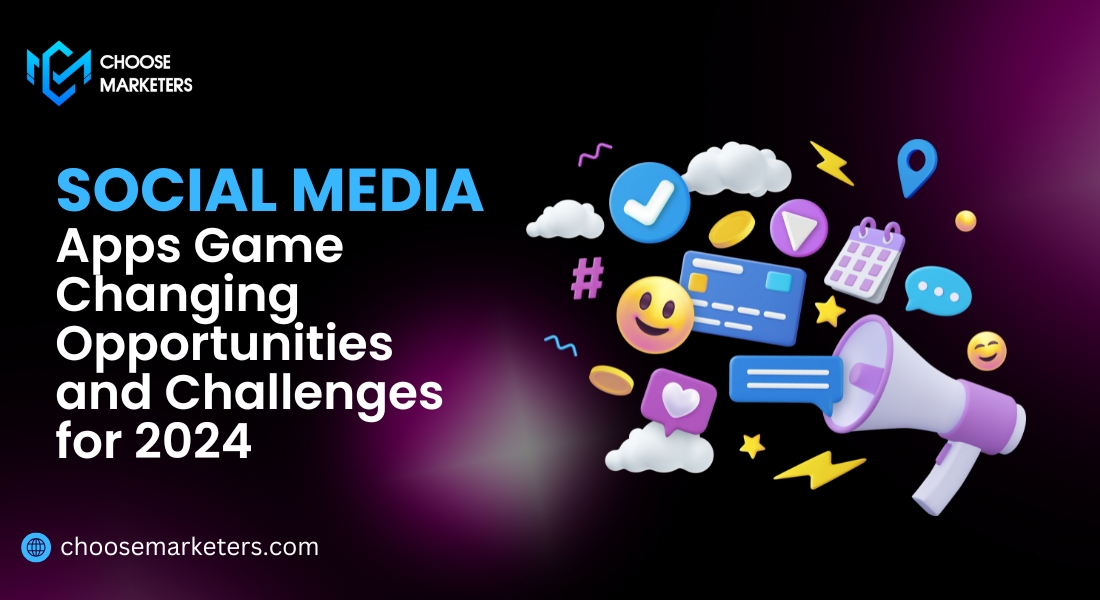

Social Media Apps – Game-Changing Opportunities and Challenges for 2024
In 2024, social media apps will continue to dominate digital communication, transforming how individuals and businesses interact with the world. From socializing to e-commerce and branding, these platforms are central to personal and business strategies. As they grow and evolve, it’s essential to understand their trends and features to stay competitive in the digital landscape. In this guide, we’ll explore the most popular apps, emerging platforms, and how businesses can leverage them effectively.
The Evolution of Social Media Apps
The journey began in the early 2000s with platforms like MySpace and Facebook, marking the start of digital social networking. As technology advanced, so did these platforms, adapting to mobile-first users, live video, and augmented reality experiences. Today, apps play a pivotal role in shaping digital content consumption, integrating more immersive features such as short-form videos and stories.
Now, mobile-first platforms like Instagram and TikTok dominate, focusing heavily on visual content and userg engagement. The rise of video-first platforms like YouTube and TikTok showcases the shift towards dynamic, interactive content as the driving force behind the success of social media apps in 2024.
Most Popular Social Media Apps in 2024

In 2024, the leading apps continue to build on their massive user bases:
- Facebook: Still a global powerhouse, Facebook maintains its dominance, especially with its robust features for personal and business networking.
- Instagram: Known for its emphasis on visual content, Instagram thrives with new features like Reels, enhancing user engagement with short, snappy videos.
- TikTok: With its explosive growth, TikTok is a go-to for short-form video content, becoming one of the most influential apps for younger demographics.
- YouTube: As the king of video content, YouTube continues to provide long-form content, educational material, and influencer-driven entertainment.
- WhatsApp: Popular for private messaging, WhatsApp remains one of the top apps for both personal and business communications.
Social Media Apps to Watch
Alongside the dominant players, several new apps are gaining traction:
- BeReal: This app promotes authenticity, encouraging users to share real-time, unedited photos, creating a space for more genuine interactions.
- Telegram: Known for its strong focus on privacy, Telegram is one of the fastest-growing apps among users who prioritize encrypted communication.
- Mastodon: A decentralized alternative to Twitter, Mastodon offers a unique, user-controlled experience, appealing to those disillusioned with traditional platforms.
- Clubhouse: Audio-based, Clubhouse continues to attract users looking for live, interactive conversations, creating a niche among apps focused on voice engagement.
These apps are carving out new niches, offering alternatives to mainstream apps, each appealing to different user needs and preferences.
Social Media Apps for Business
Businesses in 2024 need to understand the potential of various apps for reaching different audiences. Each platform offers distinct advantages:
- Facebook: With robust targeting options, Facebook remains one of the top app for advertising. Its business tools are unparalleled for both local and global reach.
- Instagram: Instagram has evolved into a vital social commerce tool, with its shopping features enabling businesses to sell products directly through the app.
- LinkedIn: LinkedIn stands out among app for professional networking and B2B marketing, providing a space for industry leaders to connect.
- TikTok: TikTok’s focus on viral content makes it ideal for businesses looking to reach younger demographics through creative campaigns.
- Pinterest: As a visual discovery platform, Pinterest helps businesses in retail, home décor, and fashion drive traffic to their websites through visually appealing content.
Social media marketing tools are essential for streamlining and optimizing digital marketing strategies. Platforms like Hootsuite, Buffer, and Sprout Social offer features for scheduling posts, analyzing performance, and managing multiple accounts from one dashboard. These tools help businesses stay consistent with their social media presence, engage their audience effectively, and make data-driven decisions for improved marketing outcomes.
For businesses, choosing the right apps for their strategies can lead to higher engagement and conversion rates.
Social Media Apps by Demographics
Different age groups gravitate towards specific apps. Younger users, particularly Gen Z, dominate platforms like TikTok and Snapchat, while Millennials prefer Instagram and Facebook. For professionals, LinkedIn is the go-to platform, while more privacy-conscious users opt for Telegram or Signal.
Understanding these demographic patterns is crucial when planning marketing strategies on SM apps. Tailoring content to the preferred platform of your target audience will result in better engagement and ROI.
Social Media Apps and Privacy Concerns
As the popularity of social media apps grows, so do concerns over data privacy and user trust. In recent years, there has been an increase in the number of users seeking apps that prioritize data security, such as Telegram and Signal. These apps offer end-to-end encryption, ensuring user communication is secure from prying eyes.
Governments worldwide are tightening regulations on data privacy, pushing apps to comply with stricter data protection laws. This shift towards greater accountability is changing how these apps operate, with platforms like WhatsApp and Facebook enhancing their privacy settings to maintain user trust.
Monetization Strategies for Social Media Apps
Monetization is key for sm apps to thrive. Platforms like Instagram and Snapchat have introduced in-app shopping and affiliate marketing, enabling creators and businesses to profit directly through the platform. Meanwhile, subscription-based models like Twitter’s X Premium offer additional features for paid users.
For businesses, these monetization tools provide multiple avenues for revenue generation, from sponsored posts and ads to brand collaborations, positioning sm apps as essential tools for growth.
The Role of AI and Algorithms in Social Media Apps
AI plays a central role in how these apps function today. Platforms like Instagram, TikTok, and Facebook use AI-driven algorithms to personalize content feeds, keeping users engaged for longer periods. These algorithms analyze user behavior, suggesting content based on past preferences, helping businesses reach more relevant audiences.
AI also powers content moderation, removing harmful or inappropriate content, which is crucial in maintaining the credibility of social media apps. As AI continues to evolve, expect more sophisticated targeting and personalization features across platforms.
Social Media Apps for Content Creators
In 2024, social media apps are essential tools for content creators, offering various ways to share and monetize their work:
- TikTok and Instagram Reels are favorites for short-form video content, driving viral trends and user engagement.
- YouTube remains the top platform for long-form video content, with monetization options through ads, memberships, and sponsorships.
- Other social media apps like Patreon enable creators to build a community around subscription-based content, allowing them to directly monetize their audience.
Content creators are integral to the success of social media apps, and businesses can benefit by partnering with influencers to reach larger audiences.
Social Media Apps and E-commerce Integration
E-commerce and social media apps have become increasingly intertwined. Instagram and Facebook offer seamless shopping experiences through their platforms, allowing users to discover and purchase products without leaving the app. TikTok has also launched its e-commerce features, tapping into the growing trend of social commerce.
Pinterest has been particularly successful with shoppable pins, turning user searches into purchases, making it one of the most effective social media apps for e-commerce businesses.
How to Choose the Right Social Media App for Your Business
With so many social media apps available, choosing the right one depends on your target audience, content type, and marketing goals. Platforms like TikTok and Instagram are ideal for visual content and younger audiences, while LinkedIn is better suited for professional services and B2B marketing.
Evaluating your audience’s behavior and the features of each platform will help you maximize your ROI on social media apps.
Top Social Media Management Tools for 2024
Using tools to manage your activity across various social media apps can significantly boost efficiency and performance. Here are some of the top tools for 2024:
| Tool Name | Features | Pricing | Best For |
| Hootsuite | Social media scheduling | $$ | SMBs and enterprises |
| Buffer | Content publishing | $ | Small businesses |
| Sprout Social | Analytics & insights | $$$ | Large businesses |
| Later | Visual planning | $ | Instagram & Pinterest |
| SocialBee | Content automation | $$ | SMBs and freelancers |
| Zoho Social | Collaboration features | $$ | Teams and agencies |
| Agorapulse | Social media CRM | $$$ | Enterprises |
| Sendible | Client management | $$ | Agencies |
These tools allow businesses to manage multiple social media apps seamlessly, improving productivity and engagement across platforms.
The Future of Social Media Apps
The future of social media apps looks exciting, with augmented reality (AR) and virtual spaces leading the charge. As AR integrates further into platforms like Instagram and Snapchat, users will be able to engage with brands in immersive ways. The rise of the metaverse will also open new doors for social interaction, creating virtual spaces where users can socialize, shop, and engage with brands.
In 2024, social media apps are more critical than ever, driving personal connections, business growth, and innovative content creation. By understanding the trends, emerging platforms, and tools available, you can maximize the potential of these platforms for your business and personal brand.

